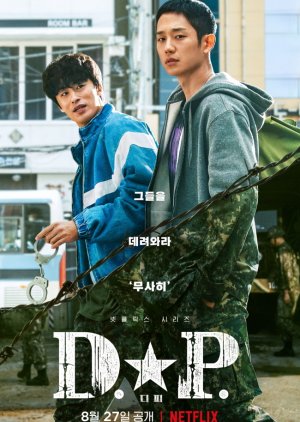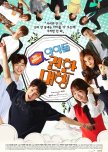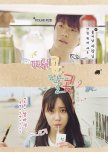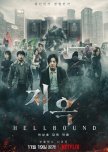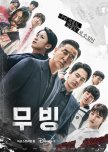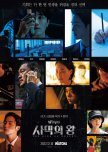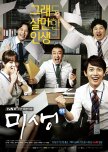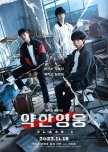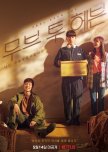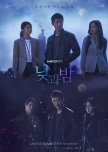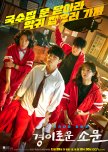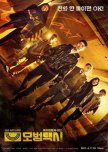
I came for Jung Hae In, and I stayed for the issues
This is just beautiful, like a walk in to some pretty cold waters from a beautiful beach, slowly getting deeper, and deeper, while the winds rise up to the perfect storm....If you are looking for a comedy this is not the place to look, even if it does use quite a bit of humour this is certainly a drama dealing with some pretty heavy issues and will probably make you feel a whole lot of anger, sorrow and may even make you cry. The early episodes will probably make you laugh too but the further you get the deeper the issues and by the fifth episode you will have been close to tears, kept on your toes and angry at the world.
What I love about this drama, besides the obvious presence of Jung Hae In, is that they dare to show the complexity to the characters, how one thing leads to another and tackle important issues such as bullying, suicide, group mentality, domestic violence, poverty and the all important bystanders in a beautiful way by using all means available. Music, cinematography, lighting all work perfectly to set the mood and are just up my alley. So I rated it with ten stars. However you should know this is my type of drama and I am extremely bias towards Jung Hae In. But if you like me enjoy issues, dark humor and Jung Hae In this drama will leave you hoping for a second season, and thinking it was way to short , they should have given it at least 10 episodes instead of the short 6.
For fellow Jung Hae In fans his character here (as well as the drama ) are more like Prison playbook than the flirty guy in Something in the rain, and yes he does this role perfectly (like always)
All in all I definitely recommend this to those who are not afraid to dip in to some dark deep waters...
P.s I laughed every time Jun Ho repeated his name and rank... I hope you will too
Edit: make sure to stay all the way, the epilog in the end is really important and worth watching (even though jhi is not present)
Was this review helpful to you?

Laughing through misery.
Saying it is a heavy watch would be an understatement. Not only will the show fuel you with anger, it will not help you calm down by the end.Showing the grim reality of the broken military system, sprinkled with comedy, made this quite an emotional ride. We are shown how a few good people are not enough to fix the environment where bad behavior is rewarded.
While it was amazing to watch the main characters trying to make even small changes, at some point they've hit the wall and needed to face the reality of how powerless they are - how they are also part of the problem. We follow a patient and introverted Joon Ho and confident and street smart Ho Yul, as they try to find and bring back defectors. During their job they face a lot of issues ranging from external issues like unsupportive and corrupted superiors to internal struggles revolving around morality and their own principles.
Warning needed - D.P. is filled with abuse, both physical and emotional, and justice is usually not served. The drama shows how it is, without trying to make the topic more approachable and easy to digest. You will be left with building up frustration, and yet glad, you decided to watch it till the end.
The cast did an amazing job. Everyone delivered both the emotional and the comedic parts well. I laughed, I cried, I shouted with anger. Biggest props to Koo Kyo Hwan for his portrayal of Ho Yul. Outstanding performance that made me fall in love with the character.
The production and the writing left nothing to desire. Mixing the tragic aspects of reality with well fitted comedic bits was done in a good taste, not taking away from the serious topic tackled.
Overall, one of the best shorter dramas of 2021. Not an easy watch, might be too much for some people - was almost too much for me. It won't leave you on a hopeful note, but it is a story worth witnessing.
Was this review helpful to you?

This review may contain spoilers
Action thriller + Comedy feat. Tragic ending
D. P. (Deserter Pursuit) is a short Netflix Korean Drama which basically is a action thriller accompanied by comedy and shades of military life, which illustrates truth and tragedy. With 6 episodes of 50 minutes, this drama surely creates some impact on millions of hearts by making us think again about the harsh reality that negligibly changes.STORY & PLOT:
The drama is about D. P. Officers who are a group of specific personnels in the army assigned to go out of the bases to catch soldiers who have deserted or escaped from the training camps for various reasons.
The drama involves Ahn Joon Ho, a newly enlisted guy, serving his 2 years mandatory military service, who is appointed as a DP officer to replace someone and is then accompanied by Han Ho Yul, who partner each other to hunt down the absconding military personnels. Sergent Park Bum Goo is the section chief for DP dept. Captain Im Ji Sup is newly transfered trainer for the base.
Given that the drama is of only 6 episodes with short duration, it's difficult to narrate even the gist but I will try. So In the drama, Ahn Jun Ho and Han Ho Yul can be seen going out to catch deserting officers. They have to investigate and look for traces by of the soldiers by different means, even so they had to spend money. And after catching them, they come back to the base.
Along with it, their is a main plotline that continues simultaneously which is about Private Cho Suk Bong, who escapes more than once and even commits criminal offence. The drama ends with his case which was a tragic one.
CAST & ACTING:
Well, our favourite oppa Jung Hae In plays Ahn Jun Ho and obviously he's an great actor who did his job right. This character of him also similar to what he had played in Prison Playbook, to a great extent. He never responded to violence and injustice but is passionate about whatever he's given to do. With a bad relationship with his family, he thrives to live well.
Koo Kyo Hwan plays Han Ho Yul and I honestly fell in love with his acting and how he looked in here, especially his hairstyle and accent of dialogue delivery. He's someone who can't stand injustice either but since he can't directly object it, he tries to prevent things in his own way.
Sergent Park Bum Goo is played by Kim Sung Kyun, my personal favourite and a great actor. I usually prefer him in comedy roles but he can ace any character given. His character is a morally upright man who can go to lengths to do his job, but anyways in the right way. He might be strict with his underlings at workplaces, he cares for them to a great deal.
DIRECTION & WRITING:
Direction is cool. Everything has been well executed. They did a good job in organizing and synchronization of events. There is not much to sound editing as they go bland mostly, but those subtle thriller editings and upbeat background scores at suitable places were good enough to keep the thrill going.
Writing is nice as well. Story progression and plot development is quite good. The showcase of humanitarian values in between, was a great idea. The illustration of harsh things like bullying and abuse inside the military bases leading to desertion, hierarchical competitions between higher authorities, isolation & violation, senior complexity are very well done. Corruption and the idea of hiding truth are also touched.
CONCLUSION:
I feel the drama is not just meant for entertainment or thrilling, it also asks us to look behind the scenes and think how cruel it is to go through injustice and yet having no way to escape other than escaping from life. I'm sure it'll create some impacting by making the audience think how wrong it's to bully and abuse someone who is weak. It also demands the change in system and regulations in the military laws and to create a safer environment for not just people serving mandatory military service, also for the professional army personnels.
Overally a good drama and worth the one time watch.
Was this review helpful to you?

Definition of military's reality
D.P. is a short drama but it still manages to be entertaining and bring up some real military life issues at the same time.It has a lot of dark, raw, gore and emotional moments, thus it’s not a light drama. However, there are also action and some stress-relief scenes perfectly balanced which make the drama easier to watch without destroying the serious tone of it. As the episodes go by, the atmosphere gets heavier and heavier. The ground is being prepared for the most intense moment of the series: the finale.
The production is pretty decent and meticulous so D.P. is pleasant to watch. There are many nice sceneries, shots, scene transitions and also, the colors and filters of the drama have been selected carefully.
The main color is yellow, the color of madness, sickness, mental illness, egoism, betrayal and caution. The more serious and dark scenes have basically cool colors but in general, D.P. is full of vivid colors similar to a comic’s color palette. The colors, in combination with the old styled (mainly jazz) soundtrack of the series, give a retro vibe. It feels like an old comic is brought to life. Every scene is like a moving comic frame and every scene transition is like turning the page.
The acting is remarkable and almost all the characters are interesting and well-written. Every actor did a great job at portraying a different character of the military corps and all of them look quite realistic. The two main characters, Ahn Joon Ho, the newbie-robot soldier who is doing everything by the book, and Han Ho Yul, the warmhearted, social and funny person that everyone wants as a friend, created a very dynamic duo.
D.P. did actually a pretty good job at highlighting the raw reality of the military and the mental deterioration that causes to humans. Enlisting in the military is like entering another reality, the reality of war. There, public laws do not exist. Human rights do not exist, only the law of the superior, the law of the powerful. Military training tries to simulate the conditions of war by letting bullying and harassment be without punishment. Although this is limited now, it still remains, and this has to change.
Was this review helpful to you?

Taking Away The Romanticism Of The South-Korean Militia…
Military enlistment is a topic which is often swept under the carpet in South-Korean culture, or romanticised in stories near the finale as part of the “ long wait” between lovers at the end of a drama storyline . ( The drama itself presenting a parody of this scene when a young woman causes a scene to promote her “ love” for her boyfriend enrolling only to present a stark contrast in the circumstances afterwards .)
PD and screenwriter Han Jun Hee as well as screenwriter Kim Bo Tong takes an anti-romantic ‘Fullmetal Jacket’ - style approach to the short series ‘ D.P’ The enlisted men alongside Jun Ho are viewed as nothing more that batch coded weapons and those who leave their side are viewed as merely loose-cannons without names or dignity . Yet the drama is unsurprisingly without director Han Jun Hee’s wry sense of comedy either- sardonic and satirical rather than sweet and slapstick, but woven well into the introduction of characters and the narrative.
The cast undeniably helped to make the storyline come to life. Actor Jung Jae In did a brilliant job ( like the rest of the cast) as main lead Jun Ho ( Jung Hae In). A troubled youth who shares his own conflicts and troubles before enlisting in the army and being forced into the military defect arrest team , Jun Ho becomes morally conflicted over the reasons why men leave the army for various personal reasons and the dire corruption of the authorities. From romantic heroism turned tragic to bittersweet realism, the duller and stark cinematography presents a harsher and prominent message to viewers about these stories shown per episode .
On a more critical note the drama isn’t without its flaws either. Whilst the messages are prominent as a criticism against the authorities and corruption ‘ D.P.’ began falling short especially after the 3/4 mark. The acting notably did degrade slightly as well as delivered line deliverances, and the pacing began to struggle Adding to the dilemma was defining more about Jun Ho’s calling of identity from given inferences in more vivid detail to explain his ideologies, as well as during the last few episodes. On the other hand the ending was certainly unexpected-profound and helping to define the key messages of the drama, but will likely leave viewers with their jaws dropping.
Overall a fairly good watch though admittedly not for the faint hearted . The pacing and more definitive character writing were sadly slight letdowns for this drama but ‘ D.P’ does make up for it with a profound and critique about the South-Korean military enlistment scheme, as well as using a catchy OST and moody cinematography to present these messages clearly .
Was this review helpful to you?

This review may contain spoilers
One of the most impactful dramas I've seen in a while!
Note: It doesn't really contain spoilers of the story, but I wanted to list the trigger warnings (that may cover on various scenarios that happen) that might be important for someone to know before they jump into this series.I don't generally write reviews much, as it's hard to find the time/passion lately! But when a series or movie manages to amaze me to the point I actually WANT to scream about how much I like it, then it's hard to resist writing about it just in case somebody might be wondering whether this drama is for them.
I won't deny, this is probably one of the heaviest series I've watched in a while, as it touches on some topics that can be quite hard to take in, so firstly, here's a list of trigger warnings of the themes you can expect before you decide to take the plunge; suicide, bullying, depression, excessive violence, gore, hazing, sexual harrassment, blood, abuse, genocide, kidnapping, torture... please let me know if there's any I missed out!
This short drama has fast became one of my favorites after I binged it in two days flat (everyone who knows me is aware I usually can't concentrate on more than one ep a day of something lmao). From the outset, the cinematography and the way it was filmed and directed was absolutely captivating. The opening scene alone is uncomfortable, and subsequently sets the tone for the rest of the drama throughout, one which leads to a two-part crescendo that just rendered me speechless by the closing scene of the final episode. This paired with the phenomenal acting that had me on the edge of my seat throughout made this drama one of the most gripping, intense and exciting experiences I've had watching something in some time. The various guest appearances round out an already fantastic cast of top-class actors, all of whom impressed me immensely and only added further to my great level of immersion.
Thankfully the drama is not all violence, blood and abuse, as between the heavy scenes there is also dashes of light humor to break the tension, for the most part thanks to Koo Kyo Hwan's character Han Ho Yeol, who buddies up with Jung Hae In's soft-hearted character Ahn Joon Ho in order to track down and bring back soldiers who have deserted the military for various reasons. And this is the majority of the structure it follows, with each episode focusing on their various expeditions all while it slowly and gradually builds to a fantastic yet shocking climax.
I have to admit that although 6 episodes is a perfect length for the story it told, I still do find myself hankering for more, especially after thoroughly enjoying the duo dynamic between both the main leads as well as their various hijinks. Personally I can hold out hoping for a spin-off or a second season, but even if that doesn't materialize, I am happy to have encountered such a well-written masterpiece, which I hope many other people will also be able to appreciate!
Was this review helpful to you?

Legalized Abuse
Every episode of D.P. Dog is like a dagger to the heart; the issues it raises are dark but have depth, especially related to the abnormal practices the military service allows to continue. It's hard to take, let alone accept these practices actually translate into real life. Only when I read an article by director Han Jun Hee, who adapted Kim Bo Tong's webcomic with the same title, D.P. Dog Day, did I realize there was truth to the fiction. In the article, the director said he wanted to follow young men in their early 20s and depict what they go through while at the same time offering a drama that could resonate with audiences by laying out current underlying issues facing South Korean society.I relate to this drama differently because my country, too, follows a conscripted military service system. I understand the need for mandatory service, especially when a country is at constant war with its neighbor; the need to be ready is that much more potent. But forced conscription where if one tries to skirt around it may affect their future not just legally but culturally that I don't understand. My country has indefinite forced conscription for both men and women who suffer intolerable psychological and physical aftermath -- the indignity of it all isolated and forced to adapt to the military’s hierarchical and disciplinary culture all while being treated so inhumanely, be it economically, mentally, or physically it's no wonder the service is viewed as a chore to escape rather than patriotic duty -- that is what's hard to stomach.
That Cho's (Jo Hyun Chul) incident comes straight from the headlines of a case of a sergeant in 2014 who went on a deadly shooting spree, reportedly as revenge for repeated bullying, makes it even that much more regrettable. Joon Ho (Jung Hae In) wailing at the end at the loss of a life whose only crime was trying to live his life to the best of his abilities with the threat of legalized abuse was sorrowing and harrowing at the same time. I admire, praise, and commend the whole cast, they all did an amazing job, and I've gained so much appreciation for their great acting abilities. The same goes for the scriptwriter for scripting such a compelling story and the director for bringing to life this raw gut-wrenching yet at the same time eye-opening drama. I hope it catalyzes the change both the civilian and military society in South Korea and other countries across this globe so desperately need. This drama will remain with me for a long time to come and is one I highly recommend.
Was this review helpful to you?

Spotlight on South Korean issues with the military
I'm gonna be honest upfront: D.P. is a very interesting and insightful drama but I am not as praising as the rest of the reviews. I rarely review, mostly because of lack of time, but I thought a little diversity in opinions wouldn't hurt. If you want to read the rest of this review, it is then up to you.So, shall we?
D. P. is the first drama that leaves me with a very strange feeling both as I was watching it and when I finished watching. It's not about the chilling violence, both psychological and physical, these men endure, nor is it the disturbing truth about the south korean (and I'm sure, from other countries) military.
I suppose I should start with the good pointsI found in this drama :
- The drama's message is well (and painfully for the viewers) transcribed and delivered. Of course, the numerous explicit scenes of abuse shows you just that, but the silences, whether it's from the other soldiers, Jun Ho, Ho Yeol or other characters, also manage to convey another insidious form of violence. Add to that the "Netflix production" label and you have a drama that will be talked about by a large number of people (thanks to/because of the short format and its easy accessibility) and who will be praised for it's directing and photography.
- This is no light topic the drama is dealing with and it's very rare to find medium be this critical and this brutally honest of such a big part of the South Korean life. Even if I'm becoming wary of Netflix productions, I must admit that the streaming platform has allowed recent dramas to explore more and more themes that are usually taboo in SK (homosexuality in Move to Heaven and So Not Worth It notably comes to mind). So hats off for the whole team who developped this story (inspired by true events I read) who makes you feel for these young men and empathise with their pain while shedding a huge spotlight on an important issue.
- The acting of the main cast was good. My congratulations to Jung Hae In and Koo Kyo Hwan especially who did well to portray soldiers scarred and troubled by their experience, yet still brought a touch of light comedy with their antics. Jumping from Reply 1988 right into D. P. was kind of a shock when I saw Kim Sung Kyun in such a different role but it simply highlights he has many cards up his sleeves. Jo Hyun Chul was also very sincere in his portrayal of private Cho Seok Bong and showcased well the slow descent into hell of a once kind-hearted man.
Having said that, you would probably assume my grade for the drama would be "good" (meaning as up to the average grade) and that my opinion is similar to that of others singing D. P.'s praise. But this is where the problems arise, so to speak. As much as D. P. has qualities, it also has flaws and it simply fell short, for me, as regards my own taste and appreciation of medium. Once again, let's detail this a bit:
- I simply. Felt bored. As much as the drama unveils a heavy story with an impactful message, I found myself looking at the clock more often than once despite the episodes being shorter than your typical drama episode. I felt that the plot was repetitive with a "deserter of the day" kind of plot whose backgrounds (except for episode 3) were more or less the same. I suppose it's to show just how large this instutionalised abuse is but in the end, even for a 6-episode drama, it fell short in keeping me interested in the plot, especially after the first two episodes when the interest started to dwindle down the drain until a slight rise in the last 20mn of the drama. Even though I admire the acting of the main cast, I couldn't get attached to one character or another (not that there are many to get attached to to begin with) and this something that prevented me from being truly connected to the story.
- The violence felt at times like a simple device of cheap shock-value to the point that I felt some of the gruesome scene simply lacked... something because of how much violence is shown. There are many ways to put violence into a story and I felt that the production often opted for a visual, almost voyeuristic, representation of it. Implication, black screen and sound and such can also represent violence, sometimes in an even more bone-chilling way than the graphic one.
- The music wasn't anything remarkable except the opening credits song. One could argue that for such a heavy drama, music becomes secondary but even the background music wasn't exceptionnaly good or even well timed. Moreover, dramas are famous for their OSTs and using songs and musics as "scene enhancers" and it's a shame to notice that the Korean Netflix productions (Kingdom, Move to Heaven, So Not Worth It, D. P. and others) are not putting in the same investment/interest. This may sound trivial in reviewing a drama but I'm a person who puts emphasis on the music so this is something I pay close attention while watchings dramas, movies and any other type of media.
Overall D. P. is an interesting drama whose message should be heard because it is important and they did well conveying it. But it wasn't enough for me to think of it as the masterpiece everyone is saying it is.
Was this review helpful to you?

"If I want things to change, I should at least do something"
That "something" may not be the right answer, but to these soldiers, it felt like the only one.D.P explores the bottom of the iceberg about the raw reality that exists inside these barracks. Not only is it a realistic portrayal of the bullying, superiority, and violence, but there's a very powerful message coming out of this drama—that not everything is black and white, but there are gray areas. Gray areas like the bystanders and the very system that enables the military to operate this way—the very reasons why these soldiers run away. However there are little cracks to that system, such as Son Seokku's character. Though it's barely scratching the surface, it gives us a sliver of hope that maybe things can change, just in a different way.
Overall, I like the way the story was set. We're introduced to Jung Haein's character, An Junho, a seemingly typical guy at first, but later proves his competence to take the position of D.P. But from the first episode, they hit us right away...and we realize that Junho is very flawed. He's not written as the usual perfect hero and I love it. He's clever but does not always make the right choices. Jung Haein did an amazing job with his role as did the rest of the cast.
By the end of the drama, I was crying buckets...even now I feel like crying again just thinking about that ending. This show is so emotionally gripping that I wanted to break down multiple times, it hurt so much how real it was. It's a show filled with subplots as we watch this journey of Junho carrying out his job, with an empathy he knows he shouldn't have, but he does. Because of this empathy, we're reminded that these deserters are not just deserters. They are human.
We're used to hearing the mentality: "What happens, happened. Move on." It's no different here, with soldiers experiencing some of the most horrid abuse but have to "man up" because that's what they're told. The ending is a bit open-ended, but we're left with this strong feeling that we can't just move on and we're responsible for change.
On another note, I really can't move on from this drama, it left a deep impression on me. The cinematography was incredible; it's so unique and did justice to the visuals in the scenes. I hope there's a season 2, because we're told that An Junho still has about 500 days in his service. Please watch it!
......ONE MORE THING: THE OSTS ARE JUST SO AMAZING. I seriously never skipped the intro/outro credits. Kudos to the music director, the discography is just perfect, perfect.
Was this review helpful to you?

This review may contain spoilers
Utilized everything they had with a great execution
Take this as an example of why shouldn't every k-drama end up in 16 episodes nor even extended to 20 episodes.The plot is focusing on the main idea of the military life and I think it was consistent to carried it out in the whole 6 episodes. No pleasantries and pleonastic. Not revealing too many things and left some of the ideas and sentiments to the spectators. And as if you were drawn to adapt to be a part of them. It feels like we can see, hear, and feel the story as if those were ours to begin with. It felt so raw and violent but you can't stop watching because you want to know what would be next to happen. The misery and agony and also the irony of the military life is well conveyed and I think it has some connection in some way with some cases that truly happened in South Korea that changed the way it runs today. Though it may be a common secret that seniority is still prominent and conspicuous in that scope, D.P. succeeding in animadvert severely on the system and let it be known what is wrong with a scant of satire and insinuation. And evidently it works so well. It still felt so realistic without exaggerating some aspects of human daily life that might distorted the whole theme of military., like romance or unnecessary laughable moments.
And, I really like how it took such an ending. Blatant mockery by the media and the military to close the case in that way and also the surprising act of camaraderie. A great cinematography and acting also play their roles well that it almost taste so immaculate to the point I'm being hesitant on my own review if I might be so biased, but undoubtedly it really deserves all the praise.
Was this review helpful to you?

Powerful, heavy message. Well balanced drama.
First off, this is not a comedy, so don't be fooled by some of the trailers. It's a drama that deals with very heavy issues, carrying a very serious message. There are comedic aspects that lead to lighthearted moments but the show is first and foremost raw, dark and saddening. It's hard-hitting from the get-go and doesn't pull any punches.Its message is critical of the military and showcases some harsh truths, which was refreshing and wonderful to see. Most military-based media (in any country) is often so pro-military they happily sweeping away the darker truths hidden there whereas this storyline brought to light some very poignant issues. Very refreshing to see the military in a light that's not tainted with the usual romanticism and propaganda.
The whole drama is perfectly balanced. The comedic aspect (mainly provided by the character Han Ho Yul) gave a nice balance to offset the darker, more tragic storylines. He did a great job of being the comedic relief without it appearing disrespectful or out of place to the wider, more serious story and his acting transitions well to be more emotional when the comedic relief tapers out towards the end. Action/fighting scenes are thrown in to keep it exciting and fairly fast-paced. Yes, the drama is raw and gritty, at times the truths you're forced to acknowledge could be difficult to watch, but they've balanced the show perfectly so that you can easily do so. There is no pretty, happy ending tied up neatly in a "drama-land" bow - the events that eventually happen are fitting and realistic in the confines of the story.
The plot perfectly captures the issues surrounding all types of bullying, corruption and abuse of power. It didn't shy away from the truth that if you sit by and do nothing you are ultimately taking the side of the bully.
Was this review helpful to you?

This review may contain spoilers
Gritty, Guttural, and Brutal
[ Not very obvious possible trigger warnings: Sexual harassment ]Set in 2014, it's a short kdrama, 6 episodes at the time of writing this(season 1), though not "sweet" in any sense of the word. It's grim and depressing, which isn't a bad thing. I certainly enjoyed it, and it made me feel for the characters, not just the protagonist and deuteragonist but for a lot more than just them.
The main takeaway I want this review to impart is this; If you romanticise the military, this kdrama probably isn't for you. It's a look at abuse within the (South Korean) military, and its heavy history of hazing - a practice not limited to SK's military - and the very nature of the self-perpetuating cycle of abuse exacerbated by the system/its perpetrators' indifference and even encouragement of the power abuse. There's themes of toxic masculinity(as armies are typically known for in pop-culture), psychological damage, sexual harassment and the strange obsession with one's "manhood"(genitalia), and general hopelessness. It's not the show pulling you aside and proclaiming, "THIS is the reality, and it can't be changed!". It's more of, "This is the reality. Do with that knowledge what you will."
The ending tore me apart, and I don't mean the ending where Jun-ho disobeys his superior and runs off into God knows where, but the one where you stay past the black screen. You'll catch a glimpse of "Fat Ass", a friend of the man you just watched shoot himself in front of Jun-ho. He's been bullied too, and it hits even harder taking into account one of the reasons he might've bonded with Suk-bong was because they both shared one thing: They were both treated like dogshit by everybody in their respective unit. After all, "I should do something."
The abuse, bullying, and harassment isn't immediate. It's clear from the progression of these episodes, and mirrors real life, that it is a bunch of acts in succession that pile atop one another until the victim's shoulders break from the crushing weight. The psychological, physical, and emotional trauma of it all mixed with hormones, heavy testosterone-drunk machoism of the military's environment, boils over into the amalgamation of consequences by end episode. Suk-bong's case is fictional and very extreme, yet it drives home the point. What does a frightened animal do when it's cornered? Only what it must. Protect itself.
For Suk-bong and his friend, that meant doing what they did. The kdrama doesn't justify that, but instead gives me this impression, "Must we wait until things are taken to the extreme before appropriate action is taken?"
Interestingly, before storming the tunnel, SDT's commander responds to Sergeant Park's protests with the reminder of the shootings in one of the Units, later mirrored in the true ending. One of Hang-soo's lackeys was also, himself, a victim of the abuse(as was everybody) by Hwang-soo, and he instead chose to take it out on Suk-bong. This is present in both the macro- and micro-level of these relationships between everybody involved. There's a reason for everybody's actions in this kdrama without vilifying, romanticising, and/or justifying, and the cycle of trauma and abuse is clear. The attention to detail and empathy is astounding, in a positive way.
As someone who's a victim of abuse, though not to this drama's extent, Jun-ho and the others' experiences resonate with me thematically. I don't subscribe to the theory that Jun-ho "snaps" in the "ending" where he runs off, but instead a small act of rebellion against the system, and a refusal of passivity and the so-loved conformity. It is the little successes that build up to big things eventually, and that leaves the viewer with just the tiniest sliver of hope, in my opinion.
Was this review helpful to you?

 2
2